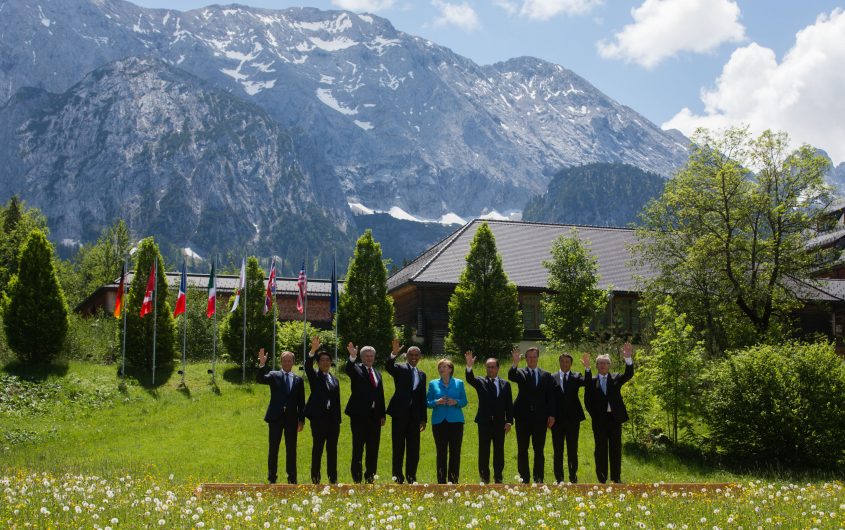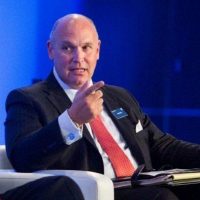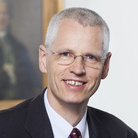
Official White House Photo by Chuck Kennedy
AGI Asks: What Is Angela Merkel’s Impact on the Global Economy

Adam Posen
President, Peterson Institute for International Economics
Adam S. Posen has been president of the Peterson Institute for International Economics since January 2013. Over his career, he has contributed to research and public policy regarding monetary and fiscal policies in the G-20, the challenges of European integration since the adoption of the euro, China-US economic relations, and developing new approaches to financial recovery and stability.

Claudia Schmucker
Head of Geo-economics Program, DGAP
Claudia Schmucker is head of DGAP’s Geo-Economics Program. Prior to that, she had headed DGAP’s Globalization and World Economy Program since 2002. She has published extensively on European and transatlantic trade policy, the World Trade Organization (WTO), and the Doha Round as well as on the role of informal global forums such as the G7 and G20.
Schmucker studied at Rheinische Friedrich-Wilhelms Universität in Bonn, at Elmira College in New York State, and at Yale University. She holds an MA in North American studies and a PhD in economics from the Freie Universität Berlin.

Francis Kelly
Founder and Managing Partner, Fulcrum Macro Advisors LLC
Francis (Frank) Kelly is Founder and Managing Partner at Fulcrum Macro Advisors LLC.

Holger Schmieding
Berenberg Bank
Dr Holger Schmieding is Chief Economist at Berenberg in London. Before joining Berenberg in October 2010, Holger worked as Chief Economist Europe at Merrill Lynch, Bank of America and Bank of America-Merrill Lynch in London. Having studied economics in Munich, London and Kiel, he holds a doctorate from the University of Kiel. Prior to this, he also worked as a journalist at Westfälische Nachrichten in Germany, as head of a research group on east-central Europe at the Kiel Institute of World Economics and as a desk economist at the International Monetary Fund in Washington, DC.

Kris Bledowski
Manufacturers Alliance for Productivity and Innovation
Kris Bledowski is Council Director and Senior Economist at the Manufacturers Alliance for Productivity and Innovation (MAPI).

Michael Hüther
German Economic Institute
Prof. Dr. Michael Huether has served as Director and Member of the Executive Committee of the German Economic Institute since 2004. He has previously worked in a number of important positions in research, teaching, and banking, including at Stanford University, the German Council of Economic Advisers, and DekaBank. Since 2001 he has held the Honorary Professorship for Economics at the European Business School. He is also a member of the EU Commission‘s Refit Platform, which advises the Commission on the efficient, effective and practical implementation of EU legislation. He has a Ph.D. in Economics and History from the Justus Liebig University in Giessen. He was awarded the Order of Merit of the Federal Republic of Germany by the President of the Republic.

Stormy-Annika Mildner
Executive Director, The Aspen Institute Germany
Stormy-Annika Mildner is the executive director at the Aspen Institute Germany and a Geoeconomics Non-Resident Senior Fellow at AICGS. She was Sherpa of the Business 20 (B20), the official Engagement Partner of the German G20 Presidency and Head of the External Economic Policy Department at the Federation of German Industries (BDI).
AGI asks:
What is the significance of Angela Merkel’s policies for the global economy?
Krzysztof Bledowski
Manufacturers Alliance for Productivity and Innovation
The Germans will look back at Angela Merkel’s tenure approvingly because they got steadily more prosperous. Under her reign, the domestic economy outperformed the Eurozone and even the EU. The economic mantra spelled stability, jobs, growth, and solid fiscal accounts.
But when viewed from outside, the impact of Merkel’s policies on the rest of the world appears nuanced. The echoes of “Germany first” clashed with the oft-professed shibboleth of multilateralism that the Germans hold so dear.
Support for European unity was Merkel’s defining legacy. Yet Germany dithered when it mattered most before agreeing to write off Greek debt. And over long decades, persistent surpluses of the public and private sectors kept adding to the already large stock of German claims on foreign assets. Within the Eurozone, these imbalances then deepened the financial crisis. The country also largely failed to deliver on lower greenhouse gas emissions amid the continued use of coal.
Among the consequential middle powers, Germany stands out with its commercially induced softness toward Russia and China. It is ironic that Merkel had failed to back Barack Obama’s “one-tank-of-gas” transatlantic trade deal but then pushed for quick closure of the comprehensive agreement on investment between the EU and China. You would be forgiven for mistaking Germany’s foe for friend here.
It is a fair plea that Germany struggles to broker policies for the global marketplace. Angela Merkel and her successors should double down on working with allies to that end. G. H. W. Bush called it “partners in leadership.”
Michael Hüther
German Economic Institute (IW Köln)
Angela Merkel began her chancellorship in an economically stable world. The upswing was ro-bust, and underlying risks – such as the real estate market in the United States—were not yet relevant to the global economy. At the 2007 G8 summit in Heiligendamm the first cracks in the foundation were felt, as was the lack of common ground and of a binding mind set between the heads of state and government. There were only limited proposals on the topics discussed, such as energy consumption, climate change, missile defense systems and aid for Africa. The art of moderation that Merkel had mastered was not enough when it came to content.
The 2008-09 global financial crisis was a game changer that was significant in every respect. Con-fidence in the ability to coordinate and steer the markets was not only shaken worldwide, but also for the German Chancellor. In terms of economic and financial policy, she had to intervene in a profound and comprehensive manner that would previously have seemed completely inap-propriate to her program. This gives rise to a motive for Angela Merkel’s economic policy under-standing over the 16 years of her chancellorship: the change from a firm belief in the market and profound doubts about the role of the state to a comprehensive skepticism about markets and a broad willingness to resort to state intervention. This applies to domestic economic policy as well as to foreign trade policy. In case of doubt, reforms for more market were withdrawn or state responsibility increased.
Since 2008, the Chancellor’s policy has been shaped by crisis management. She was particularly challenged by in the EU sovereign debt crisis from 2010 onwards. Here she managed to stay on course in accordance with the Maastricht Treaty, and she was able to get the French Presidents Sarkozy and Hollande to join her. Beyond that, however, one misses a design for the global eco-nomic order. During her chancellorship neither could new life be breathed into the Doha Round nor did she succeed in ratifying the Free Trade Agreement with Canada (CETA) in the Bundestag. There was a rhetorical commitment to free trade but one that had no practical con-sequences. Merkel’s policy towards China was more accommodative than demanding; the im-portance of the Chinese markets for German business was formative.
All in all, in the decade and a half since 2005, not only has the world economy been in transi-tion from a rather robust development during the second globalization to an exhaustion of the worldwide division of labour, risk, and knowledge. Meanwhile, Merkel – or, better put, Merkel’s economic policy approach – was also in transition. After the disappointment experienced by the markets, there was little evidence of an original design. Crisis management remained, on a case-by-case basis.
Francis Kelly
Fulcrum Macro Advisors LLC
Eighteen years ago in Berlin, I attended a business reception at the Staatliche Museums. As I chatted with a small group of German CEOs, I was introduced to the then opposition leader, Angela Merkel. She was then as she is now: subdued, hands clasped together with her intense gaze sizing up whomever she was talking to but also with that smile that radiates a genuine warmth and deep emotional intelligence. I was charmed as she asked me a few incisive questions about the political situation in Washington at the time before quickly moving on to greet another cluster of business leaders.
When she was out of earshot, one of the CEOs quietly explained to me—while all the other CEOs heads bobbed up and down in agreement—“She is likely going to be the next Chancellor but I don’t know how long she will last. She really doesn’t understand global markets or the big economic issues.” Flash forward to today: Each of those CEOs is gone and she is still Chancellor, having guided Germany, the European Union and, in a real way, the rest of the world through the largest global economic challenges and crises of the last century.
Chancellor Merkel is nothing if not a superb crisis manager: From the global financial crisis of 2008 which led to the sovereign debt crisis that gripped the Eurozone, to the storm of Brexit, she handled them all. Having sat in a large global investment bank through all this tumult, I can attest it was Merkel’s constantly calm yet steely demeanor that assured the markets—the very markets those CEOs had told me she really did not understand—that she had a firm grasp on each of these situations and somehow, some way, she knew how to solve them.
So, without doubt, the legacy of Merkel’s global economic crisis leadership is assured. Looking to the future, first and foremost the question is how will Germany and the EU deal with China. Merkel has uniquely stood out in her efforts to develop stronger trade relations with China, but understands (and hopefully whoever her successor does as well) that it is not a one-way street with China. It desperately needs what Germany’s advanced industries have to offer. And that gives Germany leverage to push China to turn away from their vile human rights policies as well as more fully respect international trade rules. It will be critical for Merkel to set the tone on how to tackle the China challenge for her successors.
Closer to home, her crisis management achievements include her careful navigation through the always chaotic and occasionally minacious Trump Administration’s trade policy toward the EU in general and Germany in particular. Many in the business community today worry that we risk the election of a Republican to the White House in four years who quickly begins echoing the Trump EU trade policy. The simple fact is the Biden Administration can only do so much to try to assure businesses on both sides of the Atlantic that will not happen. What Chancellor Merkel says and does now will ultimately be that most critical assurance sought by business.
I have no doubt history will deem her leadership as extraordinary by any measure—particularly her global economic leadership. What I do fear, however, is we will all acutely best understand just how powerful and impactful she has been when she is gone from office and the next crisis is upon us. That is when those former CEOs I stood with eighteen years ago and their many successors will hail Chancellor Angela Merkel as having positively led the global economy like very few other world leaders we have seen in more than half a century.
Stormy Mildner & Claudia Schmucker
The Aspen Institute Berlin & DGAP
German Chancellor Angela Merkel has always been a staunch supporter of international cooperation and saw the erosion of international institutions as one of the biggest threats to the world. She headed the Group of 7 (G7) twice and the Group of 20 (G20) once – the only head of state or government to do so. And she left a clear mark for the better in both fora.
At the G7 (or G8, as it still included Russia) summit in 2007 under the German presidency, Merkel prioritized shaping globalization. Under her leadership, the G8 countries committed to cutting their CO2 emissions and substantially increase the share of renewables in the energy mix. Merkel also initiated the so-called Heiligendamm process, where the G8 agreed to hold institutionalized talks with major emerging economies on issues such as climate change and development cooperation, an important step towards creating the G20 one year later.
At its summit in Elmau in June 2015 under Merkel’s leadership, the G7 agreed to reduce CO2 emissions between 40 percent and 70 percent by 2050 and to achieve a carbon-free economy by 2100. The summit thus played an important role in the preparation of the COP21 in Paris and the Paris Climate Agreement. The G7 also committed itself to preventing epidemics and supporting African countries’ health systems. Merkel also placed trade and global economic growth high on the G7 agenda.
Two years later, the German G20 summit took place in Hamburg with U.S. President Donald Trump in attendance. Despite his attempts to torpedo the G20 process, Chancellor Merkel managed to save the forum from irrelevance. She diverged from the consensus principle to keep topics like climate change on the agenda. While noting the U.S. withdrawal from the Paris Agreement, the other 19 leaders supported it as irreversible. She also managed to include the WTO— another contentious issue with the United States—in the declaration and showed great foresight by placing health on the G20 agenda for the first time. Merkel also hosted the first G20 Digital Ministers’ Meeting.
Due to her highly respected international experience and matter-of-fact approach to problem-solving, Merkel made a huge contribution to the credibility and effectiveness of the G7 and the G20 under sometimes adverse conditions. Merkel will be missed as an agenda-setter, a forger of comprise, as well as a stability and trust anchor in both fora. Not least as Germany will head the next G7 cycle, picking up the baton from the United Kingdom later this year.
Adam Posen
Peterson Institute for International Economics
The period of Angela Merkel’s chancellorship could be characterized as beset by economic challenges beyond Germany’s control: the Global Financial Crisis and the Euro Crisis which followed; the rise of China’s technological progress as well as market share; the surge in refugees; the Trump Administration’s attacks on international trade; and the Coronavirus pandemic. Despite all this, Germany did well on the metrics of economic performance which Merkel seemed to prize, including trade surpluses, employment growth, and continued success for the country’s manufacturers.
Yet, Germany arguably got very lucky during this period, sometimes even when the international policies which Merkel pursued worked against it. What China happened to want to import during its building boom of 2000-2013 was what Germany happened to make – and Germany got to benefit from China-U.S. economic competition, including China’s manipulation upward of the dollar, before it turned into outright conflict. The alliance of pro-austerity “Northern Europe” in the Euro Crisis disproportionately bailed out German banks, and the brinksmanship with Southern Europe ended up pushing Greece, Italy, and Portugal into protracted recessions, and thus a weaker euro, without effective blowback. Tariffs and other trade threats by the Trump Administration ended up backfiring on the United States before escalating.
These fortunate outcomes for Germany and Merkel in the international sphere are unlikely to last. The China-U.S. conflict and Chinese technological advancement is forcing Germany to take sides. The still accumulating weaknesses of the German financial system cannot be shifted onto Southern borrowers anymore. The euro has bottomed out and is likely to gain against the dollar in various spheres as well as in simple value. Most importantly, both the United States and China have turned more economically nationalist, less supportive of peaceful globalization, and the pandemic reinforces this trend. Meanwhile, the EU has made minimal progress towards increasing the resiliency and unity of the economic bloc – it is unclear whether this progress has kept pace with the rising challenges, let alone provided a basis for the EU to protect international commerce when the United States has stopped doing so.
Merkel’s legacy in international economics is thus far worse than it seems at first glance. Not only are the apparent successes primarily due to luck, but also some of the current mounting difficulties were made worse by her policy choices of opportunism, adherence to discredited economic orthodoxies, and reticence to ambitiously advance EU or transatlantic cooperation during the sunny times of Obama’s second term and the election of Macron around her own re-election in 2017. Resentment of German economic obstinacy and selfishness began before Trump in Washington and persists, and it likewise remains barely below the surface in Southern Europe. This legacy will be harmful in coming years to Germany and Europe.
Holger Schmieding
Berenberg
Merkel stands for stability and reason. At the helm of Europe‘s pivotal economy, she has usually steered a steady and cautious course, trying to defuse tensions and build consensus instead of pursuing revolutionary changes. She has been a firm and reliable supporter of the rules-based international order even when the United States under Donald Trump took a sledgehammer to it. She pushed early for global policies to combat climate change. While keeping an eye on German commercial interests, she firmly stood up to Russia’s Putin over Ukraine.
In domestic policies, she has occasionally made abrupt or audacious decisions such as the hasty and expensive exit from nuclear energy after Fukushima in 2012 and her humanitarian decision in 2015 to open Germany‘s borders to a stream of mostly Syrian refugees.
In the European and international arena, no single big decision will be associated with her as her unique legacy. As her key achievement, she steered Germany and Europe fairly well through turbulent times. In the euro crisis, she over-emphasized austerity and hesitated too long until she allowed the ECB to defuse the crisis by outing itself as a Fed-style lender of last resort. But when it really counted, she did what it took to support the struggling economies of Southern Europe. Defying a chorus of doomsayers, she played a key role in keeping the euro together. With a more mature ECB, a fiscal re-insurance called “European Stability Mechanism” and the EU‘s €750 billion post-Covid recovery fund, the Eurozone and the EU now stand on a more solid foundation than before Merkel.








